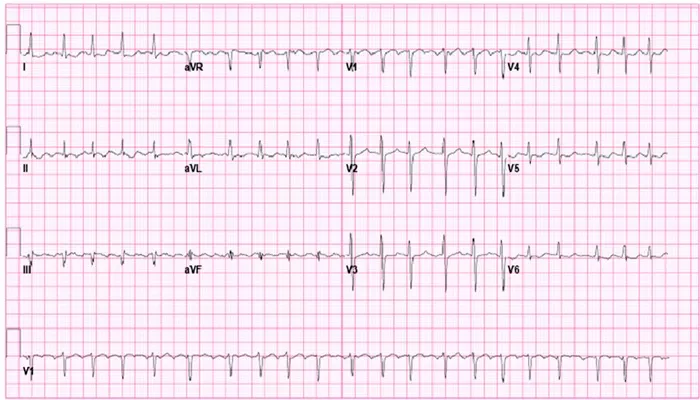As a cardiologist, I often encounter patients who are concerned about the potential link between stress and atrial flutter, a type of abnormal heart rhythm. Atrial flutter is characterized by a rapid and irregular heartbeat, which can be caused by various factors, including stress. In this article, we will explore the relationship between stress and atrial flutter, and discuss the potential impact of stress on this condition.
What Is Atrial Flutter?
Atrial flutter is a type of supraventricular tachycardia, which means that it originates in the upper chambers of the heart, known as the atria. During atrial flutter, the electrical signals in the atria become disorganized, causing them to contract rapidly and inefficiently. This can lead to a heart rate of 250-350 beats per minute in the atria and 150 beats per minute or more in the ventricles (lower chambers of the heart).
Atrial flutter can cause a variety of symptoms, including palpitations, shortness of breath, fatigue, dizziness, and chest pain.
If left untreated, atrial flutter can lead to serious complications, such as blood clots, stroke, and heart failure.
Can Atrial Flutter Be Caused by Stress
Stress is a well-known trigger for various health problems, including cardiovascular conditions. When we experience stress, our body releases hormones like adrenaline and cortisol, which can have a direct impact on our heart rate and rhythm.
During a stressful event, the body’s fight-or-flight response is activated, causing the heart to beat faster and the blood vessels to constrict.
This physiological response is designed to help us cope with the perceived threat, but it can also trigger or exacerbate certain heart rhythm disorders, including atrial flutter.
Studies have shown that stress can contribute to the development and progression of atrial flutter. Chronic stress, in particular, can lead to structural changes in the heart, making it more susceptible to electrical disturbances. Additionally, stress can weaken the immune system and increase inflammation, both of which are associated with an increased risk of atrial flutter.
SEE ALSO: Which Antidepressant Is Safest for Heart?
Differentiating Between Stress And Atrial Flutter
It’s important to note that the symptoms of stress and atrial flutter can sometimes overlap, making it difficult to distinguish between the two. Both conditions can cause a rapid or fluttering heartbeat, shortness of breath, and chest discomfort.
However, there are some key differences between stress-induced symptoms and atrial flutter:
Stress-related symptoms tend to build up gradually, while atrial flutter often starts suddenly.
Stress symptoms are more likely to occur during periods of intense emotion, while atrial flutter can happen at any time.
Atrial flutter episodes tend to last longer than stress-related symptoms.
If you experience any of the symptoms associated with atrial flutter, it’s crucial to seek medical attention, even if you suspect that stress is the underlying cause. A healthcare professional can perform various tests, such as an electrocardiogram (ECG) or a Holter monitor, to determine the cause of your symptoms and develop an appropriate treatment plan.
Managing Stress to Prevent Atrial Flutter
While stress alone may not be the sole cause of atrial flutter, it can certainly contribute to the development and progression of the condition. Therefore, it’s essential to find healthy ways to manage stress and reduce its impact on your heart health.
Here are some strategies that can help you manage stress and potentially prevent atrial flutter:
Practice relaxation techniques: Engage in activities like deep breathing exercises, meditation, yoga, or tai chi to help calm your mind and body.
Exercise regularly: Regular physical activity can help reduce stress and improve overall cardiovascular health. Aim for at least 30 minutes of moderate exercise most days of the week.
Get enough sleep: Aim for 7-9 hours of quality sleep each night, as sleep deprivation can increase stress levels and contribute to heart rhythm disorders.
Maintain a healthy diet: Eat a balanced diet rich in fruits, vegetables, whole grains, and lean proteins to support your overall health and well-being.
Limit caffeine and alcohol: Avoid or limit your intake of stimulants like caffeine and depressants like alcohol, as they can trigger or worsen atrial flutter symptoms.
Seek support: Don’t hesitate to reach out to friends, family, or a mental health professional if you’re feeling overwhelmed or struggling to manage stress on your own.
The Importance of Treatment
While managing stress is important for preventing and managing atrial flutter, it’s not a substitute for proper medical treatment. If you have been diagnosed with atrial flutter, it’s crucial to work closely with your healthcare team to develop a treatment plan that addresses your specific needs.
Treatment for atrial flutter may include medications to control the heart rate or rhythm, cardioversion (a procedure to restore normal heart rhythm), or catheter ablation (a minimally invasive procedure to destroy the abnormal electrical pathways in the heart). In some cases, a combination of these treatments may be necessary.
Conclusion
Stress can play a significant role in the development and progression of atrial flutter, a type of abnormal heart rhythm that can lead to serious health complications if left untreated. By understanding the link between stress and atrial flutter, and taking steps to manage stress through lifestyle changes and relaxation techniques, individuals can potentially reduce their risk of developing this condition.
However, it’s important to note that stress is not the only factor that can contribute to atrial flutter. Other risk factors, such as age, family history, and underlying health conditions, can also play a role. If you have been diagnosed with atrial flutter or are experiencing symptoms, it’s crucial to seek medical attention and work closely with your healthcare team to develop an appropriate treatment plan.


